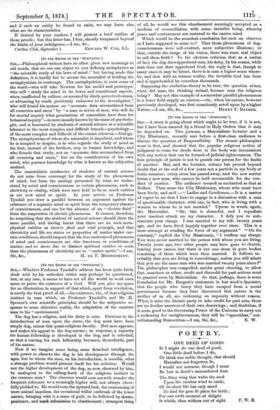[TO THE EDITOR OF THE "SPEOTITOR.1
Sts,—Whether Professor Tyndall's address has been quite fairly dealt with by his orthodox critics may perhaps be questioned, but, at any rate, it seems to have set all the world to work once more to prove the existence of a God. Will you give me space for an illustration in support of that which, apart from revelation, is surely the best proof of all,—the existence, viz., of that religious instinct in man which, on Professor Tyndall's and Mr. H. Spencer's own scientific principles, should be the subjective re- sponse to some objective reality, the adaptation of the creature man to his "environment."
The dog has a religion, and his deity is man. Previous to the introduction of man upon the scene, the dog must have been simply dog, minus this quasi-religious faculty. But man appears, and makes his appeal to the dog-nature ; in response, a capacity for human fellowship is developed in the dog, and is inherited, so that a craving for such fellowship becomes, thenceforth, part of his nature.
Now if we imagine some being, some detached intelligence, with power to observe the dog in his development through the ages, but to whom the man, on his introduction, is invisible, what a strange problem would present itself for his solution. Would not the higher development of the dog, as now observed by him, be analogous to the calling-forth of the religious instinct in the creature man? The observer would now see with wonder the frequent reference to a seemingly higher will, not always cheer- fully yielded to. He would note the upward look, the overcoming of mere animal impulses, the occasional wilful outbreak of the lower nature, bringing with it a sense of guilt, to be followed by shanie, penitence, and meek submission to chastisement ; strangest thing
of au, he week' see this chastisement seemingly accepted as a medium of reconciliation with some invisible being, whereby peace and contentment are restored to the canine mind.
Which would be the soundest conclusion for such an observer as I have supposed to come to ? That these phenomena of dog- consciousness were self-evolved, mere subjective illusions ; or that, outside the range of his vision, there was some real object to call them forth? To the obvious criticism that as a matter of fact, the dog does apprehend man, his deity, by his senses, while man does not thus apprehend God, the reply is that, though in many cases it may be latent, there is in man a higher sense where- by, and that with an intense reality, the invisible God has been and is apprehended by countless thousands.
Supposing the evolution-theory to be true, the question arises, when did man, the thinking aniroal, become man the religious being? May not this example of a somewhat parallel phenomenon in a lower field supply an answer,—viz., when his nature, however previously developed, was first consciously acted upon by a higher






























 Previous page
Previous page